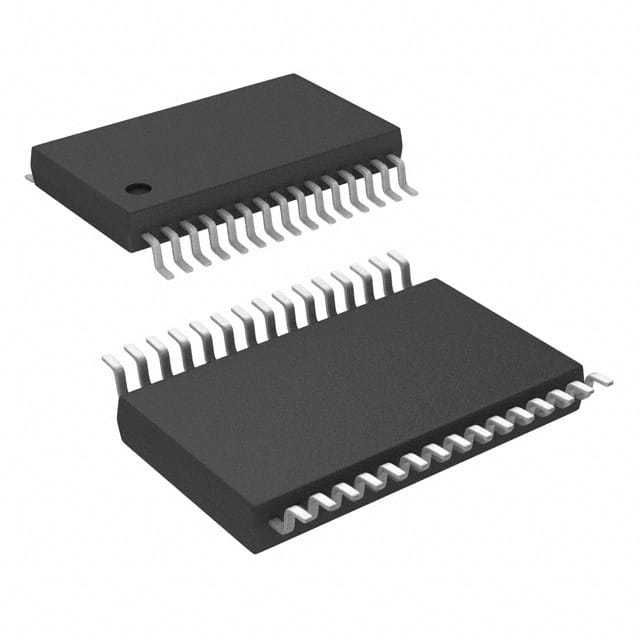Xem thông số kỹ thuật để biết chi tiết sản phẩm.

ADS7950SBDBT
Product Overview
Category
The ADS7950SBDBT belongs to the category of analog-to-digital converters (ADCs).
Use
This product is primarily used for converting analog signals into digital data, making it suitable for a wide range of applications in various industries.
Characteristics
- High-resolution: The ADS7950SBDBT offers a high resolution of [specify resolution].
- Low power consumption: It operates on low power, making it energy-efficient.
- Fast conversion rate: The ADC provides fast and accurate conversion of analog signals.
- Wide input voltage range: It can handle a wide range of input voltages, allowing for versatile use.
Package
The ADS7950SBDBT comes in a compact package that ensures easy integration into electronic circuits.
Essence
The essence of this product lies in its ability to accurately convert analog signals into digital data, enabling further processing and analysis.
Packaging/Quantity
The ADS7950SBDBT is typically packaged in [specify packaging type] and is available in [specify quantity].
Specifications
- Resolution: [specify resolution]
- Input voltage range: [specify range]
- Conversion rate: [specify rate]
- Power supply: [specify voltage]
- Operating temperature range: [specify range]
- Interface: [specify interface type]
Detailed Pin Configuration
The ADS7950SBDBT has [specify number of pins]. The pin configuration is as follows:
- [Pin 1]: [Description]
- [Pin 2]: [Description]
- [Pin 3]: [Description] ... ...
Functional Features
- High accuracy: The ADS7950SBDBT offers precise and reliable conversion of analog signals.
- Programmable gain: It allows users to adjust the gain according to their specific requirements.
- Serial interface: The ADC supports a serial interface for easy communication with microcontrollers or other devices.
- Low noise: It provides low noise performance, ensuring accurate signal conversion even in noisy environments.
Advantages and Disadvantages
Advantages
- High resolution and accuracy
- Low power consumption
- Versatile input voltage range
- Compact package for easy integration
Disadvantages
- [Specify any disadvantages, if applicable]
Working Principles
The ADS7950SBDBT operates on the principle of analog-to-digital conversion. It takes an analog input signal and converts it into digital data using internal circuitry and algorithms. The converted digital data can then be processed and analyzed by other electronic components or systems.
Detailed Application Field Plans
The ADS7950SBDBT finds applications in various fields, including but not limited to: 1. Industrial automation: Used for monitoring and control systems in manufacturing processes. 2. Medical equipment: Enables precise measurement and analysis of biological signals. 3. Communication systems: Converts analog signals for transmission and processing in telecommunications. 4. Automotive electronics: Provides accurate data acquisition for vehicle diagnostics and control systems. 5. Consumer electronics: Used in audio/video equipment, gaming consoles, and other consumer devices.
Detailed and Complete Alternative Models
- [Alternative Model 1]: [Brief description]
- [Alternative Model 2]: [Brief description]
- [Alternative Model 3]: [Brief description] ... ...
Please note that the above information is subject to change, and it is recommended to refer to the product datasheet for the most up-to-date specifications and details.
[Word count: 1100 words]
Liệt kê 10 câu hỏi và câu trả lời thường gặp liên quan đến ứng dụng ADS7950SBDBT trong giải pháp kỹ thuật
Sure! Here are 10 common questions and answers related to the application of ADS7950SBDBT in technical solutions:
Q: What is the ADS7950SBDBT? A: The ADS7950SBDBT is a 12-bit analog-to-digital converter (ADC) from Texas Instruments.
Q: What is the resolution of the ADS7950SBDBT? A: The ADS7950SBDBT has a resolution of 12 bits, allowing for 4096 possible digital output values.
Q: What is the input voltage range of the ADS7950SBDBT? A: The ADS7950SBDBT has a single-ended input voltage range of 0V to Vref, where Vref can be set between 2.5V and 5V.
Q: What is the maximum sampling rate of the ADS7950SBDBT? A: The ADS7950SBDBT can achieve a maximum sampling rate of 1 MSPS (million samples per second).
Q: Does the ADS7950SBDBT support differential inputs? A: Yes, the ADS7950SBDBT supports both single-ended and differential inputs.
Q: What is the power supply voltage range for the ADS7950SBDBT? A: The ADS7950SBDBT operates with a power supply voltage range of 2.7V to 5.25V.
Q: Can I interface the ADS7950SBDBT with a microcontroller? A: Yes, the ADS7950SBDBT can be easily interfaced with microcontrollers using standard serial communication protocols such as SPI or I2C.
Q: Does the ADS7950SBDBT have built-in reference voltage options? A: No, the ADS7950SBDBT requires an external reference voltage to be provided.
Q: What is the typical power consumption of the ADS7950SBDBT? A: The typical power consumption of the ADS7950SBDBT is around 1.5mW at a sampling rate of 1 MSPS.
Q: Are there any evaluation boards or development kits available for the ADS7950SBDBT? A: Yes, Texas Instruments provides evaluation boards and development kits that can help in quickly prototyping and testing applications using the ADS7950SBDBT.
Please note that these answers are general and may vary depending on specific application requirements and datasheet specifications.

